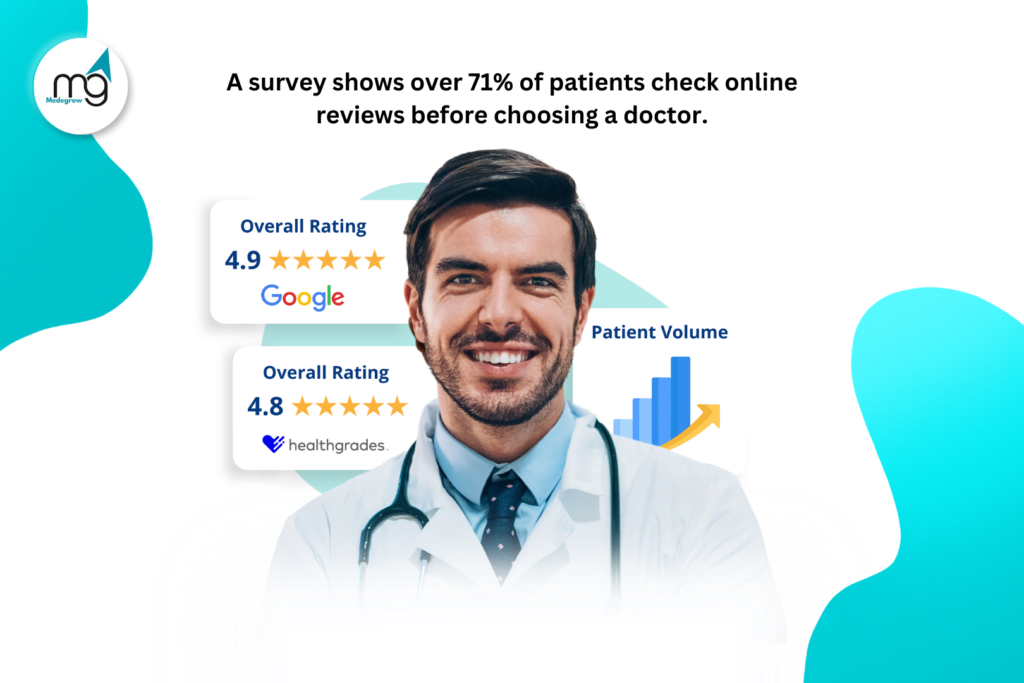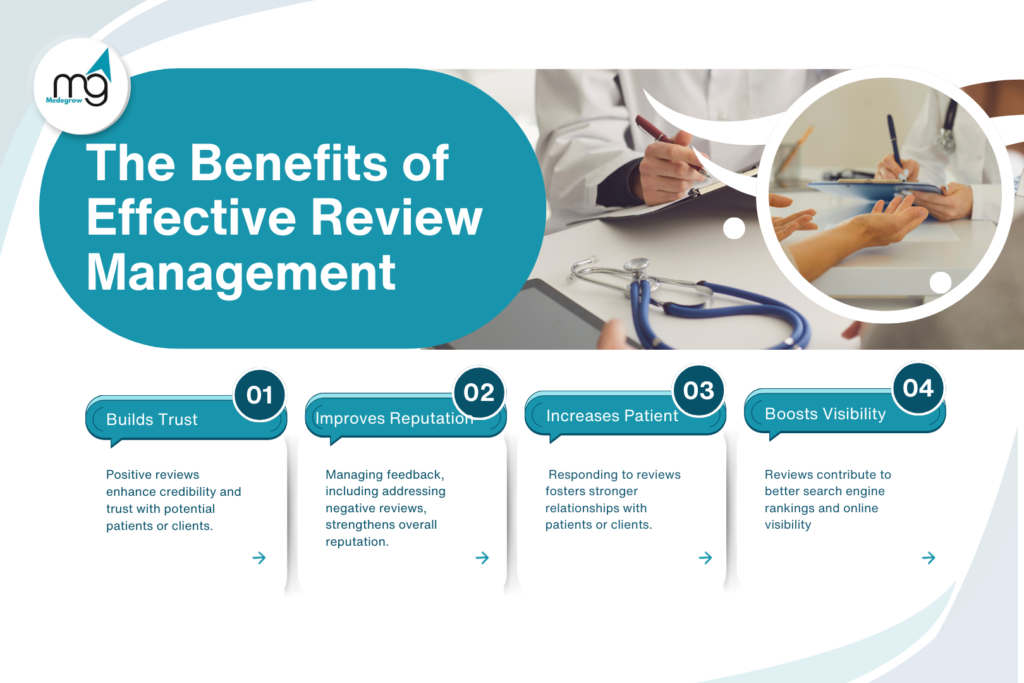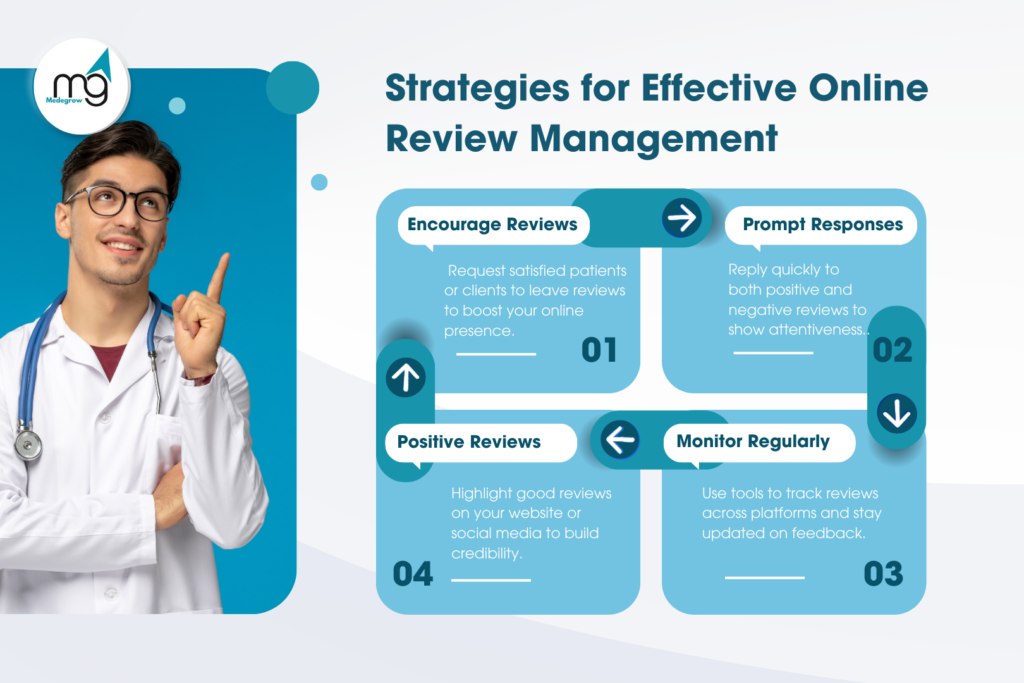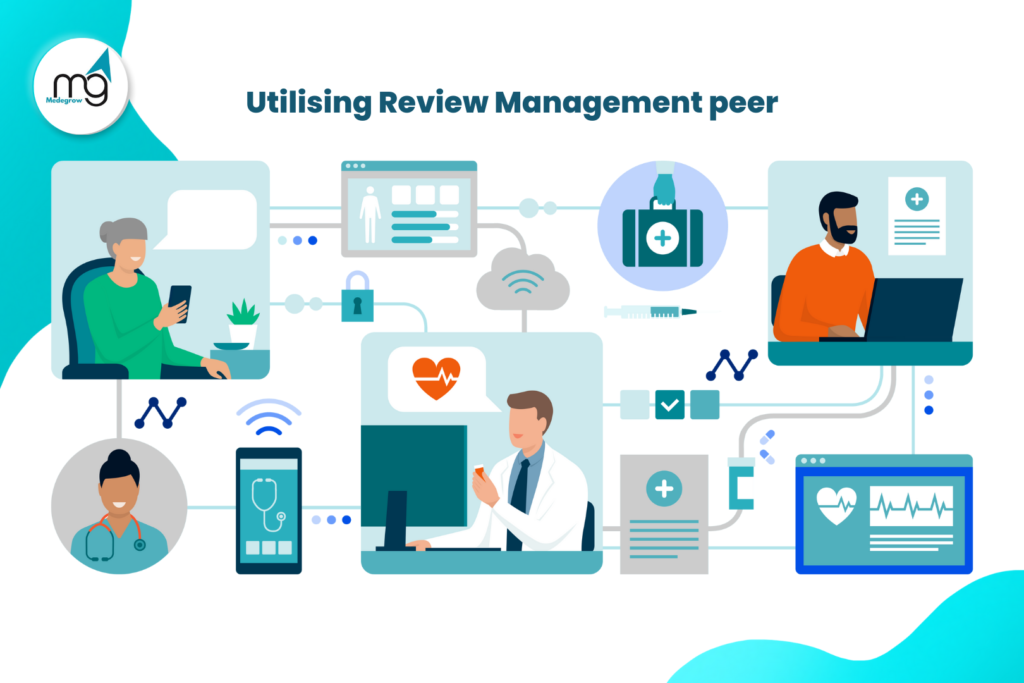
Overview of Online Reviews in Healthcare
Online reviews have transformed many sectors, and healthcare is no exception. Patients increasingly rely on online reviews to choose their healthcare providers, making these reviews crucial for a doctor’s reputation and practice. According to a survey, more than 71% of patients consider online reviews before selecting a doctor. This shift means that online review management for doctors is as essential as providing quality healthcare. In a digital age, reviews act as the modern-day word-of-mouth, influencing patient decisions and affecting the overall trust and credibility of your practice.

Purpose of the Article
This article serves to educate doctors and clinic owners about the importance of online review management for doctors and how it directly impacts their practice’s reputation. By understanding the nuances of review management, doctors can enhance their online presence, attract more patients, and foster long-term relationships built on trust and credibility.
Understanding Online Review Management for Doctors
What is Online Review Management?
Online review management for doctors is the process of monitoring, analyzing, and responding to reviews left by patients on various platforms such as Google, Yelp, Healthgrades, and RateMDs. It involves actively managing your online reputation by engaging with both positive and negative feedback. In healthcare, where trust is critical, online review management for doctors ensures that potential patients see the most accurate and favorable portrayal of your practice.
Importance of Online Reviews for Doctors

Influencing Patient Decisions
Studies show that 84% of patients trust online reviews as much as personal recommendations when selecting healthcare providers. A well-maintained profile with positive reviews can significantly influence patient decisions, while negative or unmanaged reviews can deter potential patients. This makes online reviews a pivotal factor in patient acquisition and retention.
Building Trust and Credibility
Trust is the cornerstone of healthcare, and online review management for doctors is essential as online reviews are often a patient’s first impression of a doctor or clinic. Positive reviews help build credibility and showcase a doctor’s expertise, bedside manner, and overall patient care. A strong online reputation not only attracts new patients but also fosters loyalty among existing ones.
The Benefits of Effective Review Management
Boosting Search Engine Rankings
Search engines prioritize businesses and professionals with positive reviews, especially on platforms like Google. More positive reviews lead to better visibility in local search results, making it easier for potential patients to find your practice. Online review management for doctors ensures that those with a steady stream of positive reviews are likely to appear at the top of search engine results pages (SERPs), which is crucial for local SEO efforts.

Improving Patient Acquisition
Positive reviews can boost patient confidence and make them more likely to book an appointment with you. When prospective patients see favorable feedback from others, online review management for doctors ensures they are more inclined to trust your practice and services. Effective review management ensures that your practice is portrayed in the best light possible, leading to an increase in patient acquisition.
Addressing Criticism Constructively
Negative reviews are inevitable, but how you handle them can either mitigate or magnify their impact. Responding promptly and professionally to criticism shows that you value patient feedback and are committed to improving their experience. It also provides an opportunity to clarify misunderstandings and demonstrate empathy.

Turning Negatives into Positives
Addressing negative reviews head-on can often turn a dissatisfied patient into a loyal one. Online review management for doctors involves apologizing for their negative experience and offering a solution, showing that your practice is willing to listen and make changes. This proactive approach can soften the blow of a negative review and even encourage the reviewer to update their feedback after their concerns are addressed.
Strategies for Effective Online Review Management
Encouraging Satisfied Patients to Leave Reviews
Doctors should actively encourage satisfied patients to leave reviews without being overly aggressive. Subtle tactics like handing out a reminder card, sending a follow-up email after appointments, or integrating a review request in online review management for doctors can increase your chances of receiving positive feedback.
Your patients are searching—make sure they find you! Leverage Google My Business to grow your practice.
Marketing strategies are like a compass; they guide your business toward growth and success, helping you navigate the ever-changing landscape of consumer needs

Timing and Follow-Up
The best time to ask for reviews is soon after a positive interaction. Following up with patients while their experience is fresh in their minds increases the likelihood of receiving detailed and positive feedback. Automated follow-up emails or SMS reminders can also help in this process without being too intrusive.
Utilizing Review Management Tools
Overview of Tools Available
There are several software tools designed to streamline online review management for doctors. Platforms like Podium, Reputation.com, and Birdeye offer automated systems for soliciting reviews, monitoring online feedback, and providing analytics on patient sentiment. These tools simplify the review management process and offer insights into areas for improvement.
Benefits of Automation
Automation tools help doctors save time by automating review requests, gathering reviews across multiple platforms, and alerting you to new feedback in real time. These platforms also allow you to track trends in patient feedback and gain valuable insights into areas of your practice that may need attention.

Monitoring and Analyzing Reviews
Tracking Review Trends
Regularly monitoring reviews is essential for identifying patterns in patient feedback. Are there common complaints? Do certain aspects of your care consistently receive praise? Tracking these trends will help you improve your practice’s operations and patient care.
Utilizing Feedback for Improvement
Patient reviews are a valuable source of feedback that can guide improvements in your practice. Whether it’s the friendliness of staff, waiting times, or the clarity of explanations provided by the doctor, online review management for doctors can be used to enhance your clinic’s services and patient experience.
Legal and Ethical Considerations
Complying with Regulations
Understanding HIPAA and Patient Confidentiality
One critical aspect of responding to reviews is adhering to HIPAA (Health Insurance Portability and Accountability Act) regulations. When responding to reviews, doctors must ensure they don’t disclose any private patient information, even inadvertently. This means that any engagement should be limited to general responses, such as thanking the reviewer for their feedback or inviting them to discuss their concerns offline.

Maintaining Professionalism
Best Practices for Engagement
Whether responding to positive or negative reviews, maintaining professionalism is key. Use empathetic language, avoid defensive tones, and always remain courteous. Remember, your responses are public and can be viewed by potential patients, so how you handle criticism can reflect on your practice’s professionalism.
Conclusion
Recap of the Importance of Online Review Management
Effective online review management for doctors is a critical aspect of growing and maintaining a successful healthcare practice. By understanding the importance of reviews, monitoring feedback, and engaging with patients professionally, doctors can enhance their online presence, attract more patients, and build trust in their community.
Encouragement to Invest in Digital Marketing
To stay competitive, it’s important to invest in digital marketing strategies, including online review management for doctors. A professional digital marketing agency specializing in healthcare can help doctors maintain their online reputation, attract new patients, and ensure compliance with legal regulations like HIPAA.

FAQs about Online Review Management for Doctors
What is online review management, and why is it important for doctors?
Online review management involves monitoring and responding to patient reviews on platforms like Google and Healthgrades. It is important because reviews significantly influence patient decisions and a doctor’s reputation.
How can positive reviews impact my medical practice?
Positive reviews build trust and credibility, helping to attract new patients and strengthen relationships with existing ones.
What should I do if I receive a negative review?
Respond to negative reviews promptly, professionally, and constructively. Address the concern and invite the patient to discuss their issues offline.
How can I encourage my patients to leave reviews?
Provide subtle reminders such as follow-up emails or satisfaction surveys after appointments, encouraging patients to share their positive experiences online.
Are there tools available for managing online reviews?
Yes, tools like Podium and Reputation.com help automate review management by soliciting feedback, tracking trends, and analyzing patient sentiment.
How do online reviews affect my search engine visibility?
Positive reviews can boost your clinic’s ranking on search engines, improving visibility and attracting new patients.
What legal considerations should I keep in mind regarding online reviews?
Ensure compliance with HIPAA regulations when responding to reviews to avoid disclosing any protected health information.
How often should I monitor my online reviews?
Regular monitoring, ideally weekly or biweekly, is essential to stay on top of patient feedback and address any issues promptly.


